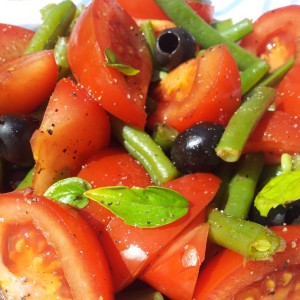This is a very simple salad that makes a lovely weekday lunch, especially on a sunny Summer’s day. I’ve not indicated any specific quantities because it’s really not critical – if you’d like me to add quantities please leave a comment and I’ll try to pay closer attention next time I make this!
French beans, trimmed
Fresh tomatoes
Fresh basil
Pitted black olives
Freshly ground black pepper
Balsamic vinegar
Method
1. Cut the beans in half. Bring a small pan of water to the boil and drop in the beans. Cook for 4-5 minutes, until the beans are cooked but still have some bite. Remove from the heat, tip the contents of the pan into a colander, and quickly run them under the cold tap for a few moments – this stops them from cooking any further and helps them to keep that lovely bright green colour.
(You could also steam the beans if you prefer – if you don’t normally cook green beans and want more detailed instructions you might find this tutorial helpful)
2. Cut the tomatoes into wedges (cut each tomato into eight if you’re using salad tomatoes or halves if you’re using cherry tomatoes – whatever seems right to you). Add these and the cooked green beans to your serving bowl.
3. Add a handful of fresh basil leaves (tear up larger leaves if necessary) and a handful of black olives.
4. Drizzle with balsamic vinegar and use your salad servers to mix all the ingredients together. Season generously with freshly ground black pepper and serve.
Nutritional highlights:
Green beans are a “good source of Protein, Thiamin, Riboflavin, Niacin, Vitamin B6, Calcium, Iron, Magnesium, Phosphorus, Potassium and Copper, and a very good source of Dietary Fiber, Vitamin A, Vitamin C, Vitamin K, Folate and Manganese.”
Read More http://nutritiondata.self.com/facts/vegetables-and-vegetable-products/2341/2#ixzz33UE75Nsw
Tomatoes are a “good source of Vitamin E (Alpha Tocopherol), Thiamin, Niacin, Vitamin B6, Folate, Magnesium, Phosphorus and Copper, and a very good source of Dietary Fiber, Vitamin A, Vitamin C, Vitamin K, Potassium and Manganese.”
Read More http://nutritiondata.self.com/facts/vegetables-and-vegetable-products/2682/2#ixzz33UEulJDT
